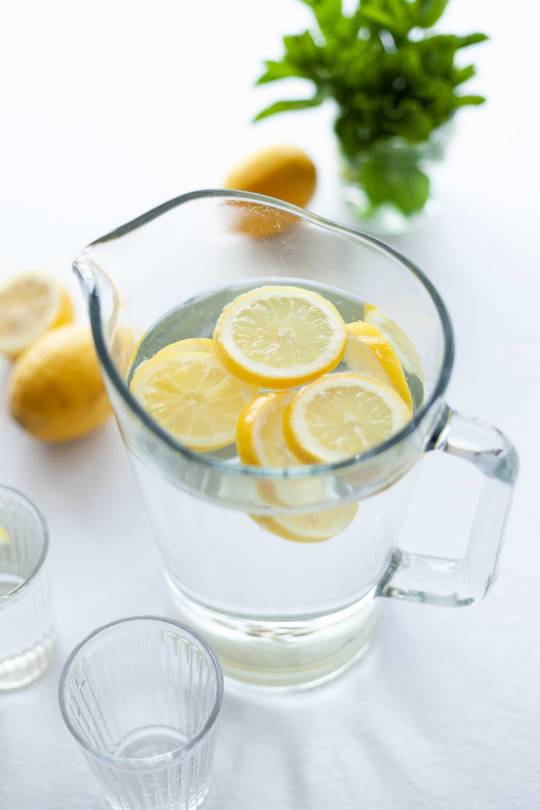It does not matter how slow you go so long as you do not stop
Don't wanna be here? Send us removal request.
Text
Lemon benefits for health & Weight loss

To begin, let's look at the truth. Simply put, Americans eat more calories per day than are needed to support their lifestyle. We eat approximately 3,600 calories per day on average. For the majority of people, this equates to at least 1,000 extra calories a day. It's no surprise that so many Americans are overweight.To begin, let's look at the truth. Simply put, Americans eat more calories per day than are needed to support their lifestyle. We eat approximately 3,600 calories per day on average. For the majority of people, this equates to at least 1,000 extra calories a day. It's no surprise that so many Americans are overweight.
When you know that 21% of calories consumed by Americans come from what they drink, it seems that this dilemma could be easily solved. Sugary drinks like juice and soda, which we all enjoy, are high in calories. There's no denying that we need fluids to survive, but they can only account for around 10% (or less) of our daily calorie intake.
We all know we can drink eight glasses of water a day, but doing so can be difficult. Water has no taste. It can seem insignificant when compared to a soda or other beverage. However, having lemon in your water for weight loss not only improves the taste of your drink, but it can also kick-start weight-loss processes in your body.
It's not about replacing meals with lemon water or starving yourself during the day and trying to make up for it by drinking lemon water to lose weight. It's all about replacing high-calorie drinks with low-calorie lemon water, which will save you anywhere from 200 to 1,000 calories per day.
What exactly is lemon water?

Lemon water is just as it says on the tin: lemon-infused water. It can be prepared in a number of ways. Some people make a glass of ice water with a few lemon slices squeezed in it.
Others make a hot tea by squeezing the lemon skins as well as the juice into the water.
It is not a tasty treat like lemonade. If the lemon flavor is too sour for you, you can sweeten it with a small amount of honey or a teaspoon of a zero-calorie natural sweetener like stevia.
What are the weight-loss advantages of lemon water?
Aside from the calorie reduction, there are other advantages of having lemon water in your diet.
Lemons have been shown to increase digestion, help prevent some forms of cancer, prevent kidney stones, and protect against anemia in studies.
It will help you lose weight while also improving your fitness. Here are a couple of the reasons why it is advantageous.
Lemon Water has a low calorie count
If you don't add any sugar to your lemon water, there are almost no calories and almost no sugar in what you're drinking.
In a glass of water, half a lemon contains about six calories. Let's equate that to an eight-ounce glass of orange or apple juice, which contains around 110 calories and 20-25 grams of sugar.
Even if you just replace one glass a day, you can save nearly 800 calories per week! Furthermore, several studies have shown that when you drink a low-calorie drink with a meal, you consume less food than whether you drink milk, juice, soda, or an alcoholic beverage.
Lemon Water Will Help You Lose Weight

Drinking more water, with or without lemon, has been shown in studies to increase metabolism.
Getting your metabolism and body into calorie-burning mode early in the day can be as simple as drinking a glass of hot lemon water. People who follow this healthy habit will also avoid or consume less calories than they would if they ate breakfast.
Lemon water adds flavor to water, making it more appealing to drink. This often leads to you drinking more water than you would otherwise.
hd wallpaper with lemon and water for detox Lovely 11 Health Benefits of Lemon Water and How to Drink It Properly
According to studies, the more water you drink, the more calories you consume at rest, also known as resting energy consumption. According to these reports, an adult's calorie burn rises by 20-30 percent over the next hour after drinking a 17-ounce glass of water!
Lemon Water Will Help You Feel More Satisfied
As previously stated, drinking water before a meal will fill you up, but particularly when you add lemon to your drink for weight loss.
According to a new report, consuming half a liter of water before eating a meal reduces the number of calories consumed by 13%.
Of course, eating less is the key to losing weight, so this is a fantastic strategy to pursue!
This, according to scientists, occurs because the water makes you feel complete despite the fact that you haven't eaten any calories. A half-liter of water, on the other hand, is an entire bottle, which is therefore difficult to finish before eating a meal. Lemon slices can be added to help give it a more exciting taste.
Lemon water helps you stay hydrated
Our bodies also have trouble distinguishing between hunger and thirst pangs. We can reach for a snack, oblivious to the fact that what our bodies really need is water. This emphasizes the importance of providing enough water in our bodies, not just for weight loss but also for overall health.
Water hydrates us while also flushing chemicals and waste from our bodies. It helps to control our body temperature, provides energy for physical exercise, lubricates our joints, and can help to relieve physical pain.
When our bodies are in good working order, we can better read what they need, which isn't always food. Furthermore, some evidence suggests that when you're well hydrated, you're better able to break down fat, which helps you lose weight. When you're well hydrated, you'll seem slimmer because you'll be less bloated and puffy.
Lemon Water and Green Tea Help to Prevent Serious Illnesses
Green tea is consumed on a regular basis by many people since it has been linked to weight loss in recent studies.
Although this is real, incorporating lemon into your green tea routine has a significant health benefit: it lowers your risk of developing some cancers. People who exercised regularly and drank four to five cups of tea a day lost two pounds more than those who did not drink tea, according to a study conducted by the Institute of Food Research. But there was another fascinating finding from this research.
Green tea contains an antioxidant called polyphenol, which inhibits VEGF, a molecule that causes heart disease and cancer.
The polyphenol, on the other hand, normally degrades before being processed by your body. When consumers added lemon juice to their green tea, the polyphenols were not broken down, according to the researchers.
Lemons also contain pectin, a fiber that has been shown in research to help with weight loss. Pectin can reduce bloating and puffiness by acting as an anti-inflammatory agent. It can also help you regulate your insulin (blood sugar) levels and reduce fat absorption in your body.
Pectin has also been shown in several studies to reduce LDL cholesterol, or "poor" cholesterol. However, you must ensure that you are not simply squeezing the lemon juice into your entire glass of water in order to reap these advantages, as pectin is most commonly found in the skin of the lemon. Furthermore, doctors say that you'd have to eat a lot of pectin before seeing any results. So don't hold your breath and drink the lemon water a couple of times a day.
Lemon water helps with detoxification
Water is essential for any detoxification program, and when you add lemons to it, you'll reap even more benefits. Lemons provide nutrients that support liver health and aid in the elimination of toxins from the body.
This is why it's important to squeeze the whole lemon into your water after you've squeezed it (if it is well-washed and you can handle the more potent taste).
A compound found in the peels will help activate your liver enzymes, allowing you to eliminate waste and, in some cases, getting your bowels going if you've been having problems.
Lemon Water Keeps You from Getting Sick
Consider the last time you were sick. You may have lost some weight from not eating, but you easily regained it once you felt better, right? You probably still couldn't go to the gym or keep up with your daily workout routine.
The naturally occurring vitamin C present in lemons will help keep you safe and free of disease, which is some positive news about drinking lemon water. This is due to vitamin C's ability to improve the immune system.
Vitamin C is a powerful antioxidant that battles free radicals in your body, which can trigger illness and disease as you age. So, how much can a single lemon help you? One lemon provides 187 percent of your daily vitamin C requirement.
Lemon in water for weight loss

A cup of lemon water first thing in the morning will rehydrate you and give you an energy boost. Not only that, but it will start your day by flushing any toxins out of your system that your body worked hard to process the night before. If you have a habit of being hungry right after waking up, the lemon water can help to alleviate some of those hunger pangs! Drinking lemon water first thing in the morning allows you to brush your teeth after indulging in the delicious yet acidic beverage.
Lemon juice's acidity can harm your teeth's enamel, particularly if you don't just squeeze the juice but also put the lemon slice into your glass.
It's best to rinse your mouth with plain water after drinking your glass of lemon water, then wait at least 10-15 minutes before brushing or using toothpaste to ensure that any remaining lemon juice on the surface of your teeth isn't interacting with any brushing or toothpaste.
You should also drink your lemon water through a straw to lessen the damage to your teeth's enamel.
In the end, there is no miracle pill or drink that can help you lose weight quickly. And lemon water isn't a sure thing. You will save calories per day if you eat, exercise, and substitute sugary or alcoholic beverages with lemon water, and you will find that you are healthier and hopefully lose weight over time.
0 notes
Text
Is it still healthy to do intermittent fasting every day, like just eating once a day?

The key advantages of intermittent fasting are:
Burning fat
•When your glycogen stores are depleted, you begin to burn FAT rather than carbohydrates. Intermittent fasting accelerates the fat-burning process compared to conventional dieting. In other words, you begin to make use of the energy that your body has stored (fat).
Reduce Hunger
•During your non-eating windows, your appetite is reduced. Your body soon becomes used to your eating routine. You stop being hungry all the time after a week or two of intermittent fasting. You'll get even better results if you stay away from carb-heavy foods that trigger an insulin spike. An insulin spike causes your blood sugar to crash, and guess what? You're hungry again.
Insuline sensitivity
•Insulin sensitivity is a term that refers to the ability to react to Intermittent fasting (IF) has been shown to improve whole-body insulin sensitivity in humans. This means that after feeding, you produce less insulin, resulting in less appetite and a lower risk of diabetes.
More advantages of IF:
•Improve Insulin sensitivity . High insulin sensitivity helps the body's cells to better use blood glucose, lowering blood sugar levels.
•Reduces insulin resistance. If you have high insulin resistance, the cells do not absorb as much glucose, which might lead to excessively high blood sugar levels. Without management, this can progress to type 2 diabetes.
•Increased production of Human Growth Hormone. That means better regeneration, less muscle loss, and more muscle growth.
• There is a lower risk of neurological disorders. Alzheimer's disease, Multiple Sclerosis, and other diseases are less likely.
•Productivity is a term used to describe how productive people are. Your energy levels will be much more steady during the day without the frequent rises and crashes of blood sugar, allowing you to be more efficient.
•Gut health is important (Interesting source). A balance of different types of bacteria in the gut is needed for optimal gut health. When a person's gut flora becomes out of control (dysbiosis), those bacteria can overgrow and cause serious problems. By keeping various types of gut bacteria in check, IF has shown promising results in helping to preserve gut balance.
•And if you’re interested in starting Intermittent Fasting, there’s no better way to do it than with the Dofasting app.
0 notes
Text
5 Mistakes You Should Avoid When Dieting

Excluding the wrong foods and sticking to overly strict eating plans can do more harm than good.
If you've ever made a New Year's resolution to eat healthier, you know how tempting it is to fall back into bad eating habits. "People go into these plans with the best of intentions," says registered dietitian Kathy McManus, director of the Department of Nutrition at Harvard-affiliated Brigham and Women's Hospital (www.brighamandwomens.org).
It's important to consider the little factors that can throw you off track, whether you've selected an eating plan to lose weight or to fix a health issue (for example, a low-salt diet to help reduce your blood pressure).
Check to see whether you remember any of the following popular blunders, and use McManus' advice to help you avoid them.
1Consumption of a diet that is too restrictive
It's difficult to adhere to diets that require you to eliminate foods in an unreasonable manner. For example, if you swear you'll never eat another sweet again, you're more likely to give in to cravings than if you gave yourself a fair treat every now and then. "Restriction isn't a long-term solution. You must consider the long term implications of your decision "According to McManus.
She advises that you stick to your new diet plan for the rest of your life. "Balance it out so you don't feel cheated," she advises. If you want a treat, keep in mind your daily calorie intake (which should be adjusted to your health and weight), and note that a small amount of added sugar is appropriate — the American Heart Association recommends no more than 24 grams per day for most women and 36 grams per day for most men.
2. . Cutting out the ingredients that aren't good for you
McManus cautions against avoiding nutritious foods because you believe they are unhealthy. Yes, artificial trans fat (found in packaged foods, which increases "poor" LDL cholesterol and triglycerides while lowering "healthy" HDL cholesterol), saturated fat (found in foods like butter and red meat), and refined or packaged foods should all be avoided (which are typically high in salt, sugar, and trans fat). But don't overlook the following:
Fats that are good for you. Some people may have a fear of dietary fat since the no-fat eating craze of the 1990s. While fats have more calories per gram than carbohydrates and protein, unsaturated fats are important for heart health. When saturated fats are replaced with unsaturated fats, LDL and total cholesterol levels are reduced. Avocados, olive oil, almonds, nut butters, and seeds are all good sources of healthy fats.
Fruits are a type of food. Sugar is present in nature's sweet treats, but the body processes it differently than added sugar because of the fiber in fruit. Don't forget the fruits are high in vitamins and antioxidants as well. Berries, in particular, have been linked to weight loss and a reduced risk of heart disease.
3. Keeping unhealthy foods close at hand
It's more difficult to stay away from unhealthy items if you have them in your pantry, even if they're only for special occasions. "The only thing you can do is eat nutritious food," McManus advises. "When you're in need of a snack, that's what you'll reach for. If you buy a half gallon of ice cream, though, it will inevitably make its way into your stomach."
Instead, go out and buy it when you want a great cake or something you shouldn't have every day — not well in advance.
4. Eating at night
It's not a good idea to eat late at night. Maintaining a habit of eating while watching TV, for example, can lead to overeating. It's also unhealthy to save your daytime calories for a nighttime meal.
"During the day, when you're expending energy, you need calories," McManus says. "And if you don't eat enough during the day, you could overeat at night if you don't eat enough during the day." Furthermore, eating too close to bedtime can cause heartburn, which can make it difficult to get a good night's sleep.
McManus recommends that you reconsider your meal schedule and spread out your calories during the day. If you're hungry late at night, a snack (such as fruit or a handful of nuts) might be appropriate if it's part of a balanced meal plan and falls within your calorie targets.
5. Not keeping track of your food intake
"It makes you aware on a regular basis of what you're putting in your mouth and how much you're eating," McManus says. "It makes you aware on a regular basis of what you're putting in your mouth and how much you're eating." She also points out that keeping track of your diet gives you a big picture, allowing you to see what's working and what isn't. "Maybe you'll notice you're overeating at night because you're starving," McManus suggests.
Keeping a food diary is one solution to this issue. Using a pen to jot down notes, or an app (for an electronic device) like My Fitness Pal (www.myfitnesspal.com)
which links you to applications that aid you manage weight goals and physical activities.
0 notes
Text
Unusual Methods to Burn Calories and lose weight:
Burning more calories will aid in weight loss and maintenance.
Exercising and consuming the right foods are two good ways to do this, but there are other, more unconventional ways to increase the calorie burn.
Here are six unusual ways to lose weight:
1. Cold exposure

Cold temperatures will help you burn more calories by inducing brown fat production in your body.
Though white fat makes up the majority of your fat stores, brown fat makes up a small percentage. The functions of these two forms of body fat are distinct.
The primary role of white fat is to store energy. Inflammation and insulin resistance can be exacerbated by having so much white fat tissue.
Brown fat, on the other hand, is primarily responsible for maintaining body heat during cold exposure.
The calorie-burning effect of brown fat has been shown to differ between people. Obese people, on average, seem to have less active brown fat than people of normal weight.
Chronic exposure to cold is thought to cause the browning of white fat in animals, but this is still being researched.
According to human research, depending on the amount of active brown fat in your body, exposure to cold temperatures may significantly increase calorie burning.
Furthermore, you do not need to be exposed to subzero temperatures to profit from this.
Healthy young men with identical body compositions were placed in a 66°F (19°C) setting for two hours in one analysis. While all of them raised their calorie burning, the impact was tripled in those who had the most brown fat operation.
Another research found that exposing 10 lean young men to a temperature of 62°F (17°C) for 2 hours resulted in an extra 164 calories burned per day on average.
Slightly reducing the temperature in your house, taking cold baths, and going outside in cold weather are all good ways to get the benefits of cold exposure.
SUMMARY
It has been shown that exposure to cold temperatures stimulates brown fat activity, which increases the amount of calories burned.
2. Drink cold water

Water is the perfect beverage for keeping hydrated and quenching thirst.
In both normal and overweight adults and infants, drinking water has been shown to temporarily increase metabolism. Some studies even indicate that drinking cold water will help you get the most out of this effect.
According to one group of researchers, the body warming up the water to body temperature accounts for 40% of the rise in metabolic rate.
Drinking 17 ounces (500 ml) of cold water for 90 minutes increased calorie burning by 24–30 percent in two studies of young adults.
However, since the study was limited, additional research indicates that the impact of water on metabolic rate varies from person to person.
Another research found that drinking 17 ounces (500 ml) of cold water increased calorie consumption by just 4.5 percent for 60 minutes in healthy young adults.
Summary
Drinking cold water has been shown to increase calorie burn for a short period of time. However, the intensity of this effect can differ from person to person.
3. Donate blood

At least momentarily, having your blood drawn raises the amount of calories you burn.
When you donate blood, the body expends energy to replace what has been lost by synthesizing new proteins, red blood cells, and other blood components.
Donating blood isn't something you can do every day, of course. To replenish your blood supply, you should wait at least eight weeks between blood draws.
Furthermore, research suggests that donating blood has a number of health benefits, including lowering inflammatory markers, increasing antioxidant activity, and lowering the risk of heart disease.
Most importantly, every time you donate blood, you might be saving a life.
SUMMARY
Donating blood helps save lives while also temporarily raising the calorie burn and providing other health benefits.
4. Chew gum

ewing gum has been shown to increase feelings of fullness when snacking and decrease calorie intake.
It may also help to speed up your metabolism, according to some research.
Normal-weight men consumed meals on four different occasions in a small sample. They burned slightly more calories after eating and then chewing gum.
Chewing gum for 20 minutes after each meal improved metabolic rate in another study of 30 young adults, compared to not chewing gum. Furthermore, after an overnight fast, the rate remained higher.
If you want to try this process, make sure you use sugar-free gum to protect your teeth's health.
SUMMARY
Chewing gum after or in between meals tends to boost metabolic rate. To protect your teeth, stick to sugar-free gum.
5. Laugh often

Laughs is also touted as the best treatment.
Laughter has been shown to enhance many aspects of mental and physical health, including memory, immunity, and arterial function, according to studies.
Additionally, laughing burns calories.
In one experiment, 45 couples watched comedies or dramas together. When they laughed during the funny movies, their metabolic rate increased by 10–20 percent
Although this isn’t very much, laughing on a regular basis is still a great way to improve your overall health and make you happier.
SUMMARY
Studies suggest that laughing causes a slight increase in metabolic rate. Plus, it may improve your overall health and increase your quality of life.
6. Fidget more

Exercising consumes calories and aids in weight loss.
More subtle types of physical activity, on the other hand, will increase your metabolic rate. Non-exercise activity thermogenesis (NEAT) is a term that involves fidgeting.
Fidgeting is described as a restless movement of body parts, such as bouncing a leg, tapping fingers on a table, or playing with rings.
Fidgeting while seated or standing was found to burn five to six times more calories on average than sitting or standing still in one study.
Fidgeting and other forms of non-exercise activity increased metabolic rate the most in people with the highest body weight, according to another study.
In certain cases, NEAT will significantly increase the amount of calories you burn each day.
For example, depending on a person's weight and activity level, a combination of fidgeting, walking, and standing could burn up to 2,000 extra calories per day, according to one group of researchers.
Fidgeting and other types of non-exercise activity are being encouraged to be included in people's everyday lives because they may help them burn calories and avoid weight gain.
Taking the stairs, standing at a desk, and cleaning are several other ways to profit from NEAT.
SUMMARY
Fidgeting has been shown to increase the amount of calories burned while sitting and standing, especially in overweight people.
The bottom line
The amount of calories you burn per day is determined by your metabolic rate.
Your metabolic rate is influenced by a variety of factors. You will improve your rate by making easy lifestyle adjustments, which will help you burn more calories and lose weight.
Fidgeting, drinking lots of cold water, smiling more often, chewing gum, and giving blood are only a few of them.
Although the efficacy of these weight loss methods may seem insignificant at first, they may have a long-term impact.
#weight loss#lose weight#health#tips to lose weight#burn fat#burn calories#increase metabolism#fitness
3 notes
·
View notes